With regards to “corruption” and Vatican Council II’s declaration of doctrine to religious freedom, it is imperative to review Cardinal Newman’s understanding of “corruption.” Newman articulates corruption with several analogies of which, to find what a corruption or perversion of the truth is, we must inquire to what the word means when utilized literally of material substances. First, corruption is a word attaching to organized matters only; a stone may be crushed to powder, but it cannot be corrupted. Corruption, on the contrary, is the breaking up of life, preparatory to its termination. This resolution of body into its component parts is the stage before its dissolution; it begins when life has reached its perfection, and it is the sequel, or rather the continuation of that process towards perfection, being at the same time the reversal and undoing of what went before. Regression is reached, the body has a function of its won, an a direction and aim in its action, a nature with laws; these it is now losing, and the traits and tokens of former years; and with them its vigour and powers of nutrition, of assimilation, and of self-reparation (Cardinal Newman, 1989, 170).
With the above information provided, the Vatican Council declares that the human person has a right to religious freedom. Freedom of this kind means that all men should be immune from coercion on the part of individuals, social groups and every human power so that, within due limits, nobody is forced to act against his convictions nor is anyone to be restrained from acting in accordance with his convictions in religious matters in private or in public, alone or in associations with others. The Council further declares that the right to religious freedom is based on the very dignity of the human person as known through the revealed word of God and by reason itself. This right of the human person to religious freedom must be given such recognition in the constitutional order of society as will make it a civil right (Flannery, O.P., 1996, 800).
Utilizing Newman’s first note, characteristic as it is of faithful developments must not be pressed to the extent of denying all variation, considerable alteration of proportion and relation, as time goes on, in the parts or aspects of an idea will show great changes in outward appearance and internal harmony occur in the instance of the creation itself. More subtle still and mysterious are the variations which are consistent or not inconsistent with identity in political and religious developments (Cardinal Newman, 1989, 173). In like manner, ideas may remain, when the expression of them is indefinitely varied; and we cannot determine whether a professed development is truly such or not, without some further knowledge than an experience of the mere fact of this variation. Real perversions and corruptions are often not so unlike externally to the doctrine from which they come, as are changes which are consistent with it and true developments. One cause of corruption in religion is the refusal to follow the course of doctrine as it moves on, and obstinacy in the notions of the past (Cardinal Newman, 1989, 172-177).
The search for truth, however, must be carried out in a manner that is appropriate to the dignity of the human person and his social nature, namely, b free enquiry with the help of teaching or instruction, communicating and dialogue. It is by these means that men share with each other the truth they have discovered, or think they have discovered, in such a way that they help one another in the search for truth. Moreover, it is by personal assent that men must adhere to the truth they have discovered (Flannery, O.P., 1996, 801). An idea then does not always bear about it the same external image; this circumstance, however, has no force to weaken the argument for its substantial identity, as drawn from its external sameness, when such sameness remains. On the contrary, for that very reason, religious freedom becomes so much the surer guarantee of the healthiness and soundness of development of doctrine with regards to religious freedom (Cardinal Newman, 1989, 178).
The Council continues that the private and public acts of religion by which men direct themselves to God according to their convictions transcend of their very nature the earthly and temporal order of things. The common good of society consists in the sum total of those conditions of social life which enable men to achieve a fuller measure of perfection with greater ease. It consists especially in safeguarding the rights and duties of the human person. For this reason the protection of the right to religious freedom is the common responsibility of individual citizens, social groups, civil authorities, the Church and other religious communities (Flannery, O.P., 1996, 804). The second note from Newman expounds upon what the Council conveyed, not only as principle but more so as doctrine. Newman utilizes a mathematical expression to convey this thought of formula. Principles are abstract and general, doctrines relate to facts; doctrines develop, and principles at first sight do not; doctrines are intellectual, and principles are more immediately ethical and practical. Systems live in principles and represent doctrines. Personal responsibility is a principle, the Being of a God is a doctrine; form that doctrine all theology has come in due course. Yet the difference between the two sometimes merely exists in our mode of viewing them; and what is a doctrine in one philosophy is a principle in another (Cardinal Newman, 1989, 179).
Doctrines stand to principles, as the definitions to the axioms and postulates of mathematics, it might also be expected that he Catholic principles would be later in development than the Catholic doctrines, inasmuch as they lie deeper in the mind, and are assumptions rather than objective professions. Doctrines stand to principles, if it may be said without fancifulness, as fecundity viewed relatively to generation, though this analogy must not be strained. Doctrines are developed by the operation of principles, and develop variously according to those principles. Religious investigation sometimes is conducted on the principle that it is a duty “to follow and speak the truth,” which really means that it is no duty to fear error, or to consider what is safest, or to shrink from scattering doubts or to regard the responsibility of misleading; and thus it terminates in heresy or infidelity, without any blame to religious investigation in itself (Cardinal Newman, 1989, 180).
The right to freedom in matters of religion is exercised in human society. For this reason its use is subject to certain regulatory norms. In availing of any freedom men must respect the moral principle of personal and social responsibility; in exercising their rights individual men and social groups are bound by the moral law to have regard for the rights of others, their own duties to others and the common good of all. For this reason the Vatican Council urges everyone, especially those responsible for education others, to try to form men with a respect for the moral order who will obey lawful authority and be lovers of true freedom—men, that is, who will form their own judgments in the light of truth, direct their activities with a sense of responsibility, and strive for what is true and just in willing cooperation with others (Flannery, O.P., 1996, 805).
It is located within the third note where power of development is a proof of life, not only in its essay, but especially in its success; for a mere formula either does not expand or is shattered in expanding. A living idea becomes many, yet remains one. The attempt at development shows the presence of a principle, and its success the presence of an idea (Cardinal Newman, 1989, 186).
The stronger an more living is an idea, that is, the more powerful hold it exercises on the minds of men, the more able is it to dispense with safeguards, and trust to itself against the danger of corruption. Forms, subscriptions or Articles or of religion are indispensable when the principle of life is weakly (Cardinal Newman, 1989, 188). Logic is the organization of thought, and, as being such, is a security for the faithfulness of intellectual developments; and the necessity of using it is undeniable as far as this, that its rules must not be transgressed. Thus, the process of development capable of a logical expression, has sometimes been invidiously spoken of as rationalism and contrasted with faith. Though a particular doctrine or opinion which is subjected to development may happen to be rationalistic, and, as is the original, such are its results (Cardinal Newman, 1989, 191). Thus, utilizing a combination of the third and fourth notes from Newman, we can better understand the development of the doctrine of religious freedom. Inasmuch as the correctness or trueness of the doctrine with the utilization of “mans” responsibility to eachother.
Since an idea is living or influential and effective, it is sure to develop according to its own nature, and the tendencies that are carried out on the long run, may under favorable circumstances show themselves early as well as late, and logic is the same in all ages, instances of a development which is to come, though vague and isolated, may occur form the very first, though a lapse of time be necessary to bring them to perfection (Cardinal Newman, 1989, 195). Accordingly, as we can see from the time of Vatican Council II, there have been many “religious freedoms” granted throughout the world. Although, keeping in mind of the unity within the one universal church being the goal, one must be able to expound upon their human understanding and travel that journey within the scope of our distinctiveness with God. This doctrine guarantees that acceptance.
Within the sixth note we discovered a gradual conversion form a false to a true religion, plainly, has much of the character of a continuous process or a development, in the mind itself, even when the two religions, which are the limits of its course, are antagonista. True religion is the summit and perfection of false religions; it combines in one whatever there is of good and true separately remaining in each (Cardinal Newman, 1989, 200). This particular paragraph reinforces what was stated in the latter paragraph. One must be able to explore upon their individuality and personal experience of God in order to truly ascertain from themselves the trueness of one particular religion. If not for the doctrine of religious freedom, where then would one be able to explore? Since the corruption of an idea, as far as the appearance goes, is a sort of accident or affection of its development, being the end of a course, and a transition-state leading to a crisis, it is as has been observed above, a brief and rapid process. While ideas live in men’s minds, they are ever enlarging into fuller development: they will not be stationary in their corruption any more than before it; and dissolution is that further state to which corruption tends. Corruption cannot, therefore, be of long standing; and thus duration is another test of a faithful development (Cardinal Newman, 1989, 203).
Newman sums it up best with the proceeding paragraph. Doctrines of the Church have withstood the test of time and criticism from generation to generation. Man’s ability to discern (on occasion) has been skewed to say the least. This particular doctrine, reinforces the ability of mans ability to “choose” for himself and to discern. The Doctrine of Religious Freedom has withstood the test of time, by sprouting as an idea to what we have today.
Reference:
Cardinal Newman, J. H. (1989). An Essay on the Development of Christian Doctrine. Indiana: Notre Dame.
Flannery, A. O.P. (1996). Vatican Council II Volume 1 The Conciliar and Post Conciliar Documents. Northport, New York: Costello Publishing Company.
Christian Education
"Since all Christians have become by rebirth of water and the Holy Spirit a new creature(8) so that they should be called and should be children of God, they have a right to a Christian education. A Christian education does not merely strive for the maturing of a human person as just now described, but has as its principal purpose this goal: that the baptized, while they are gradually introduced the knowledge of the mystery of salvation, become ever more aware of the gift of Faith they have received, and that they learn in addition how to worship God the Father in spirit and truth (cf. John 4:23) especially in liturgical action, and be conformed in their personal lives according to the new man created in justice and holiness of truth (Eph. 4:22-24); also that they develop into perfect manhood, to the mature measure of the fullness of Christ (cf. Eph. 4:13) and strive for the growth of the Mystical Body; moreover, that aware of their calling, they learn not only how to bear witness to the hope that is in them (cf. Peter 3:15) but also how to help in the Christian formation of the world that takes place when natural powers viewed in the full consideration of man redeemed by Christ contribute to the good of the whole society.(9) Wherefore this sacred synod recalls to pastors of souls their most serious obligation to see to it that all the faithful, but especially the youth who are the hope of the Church, enjoy this Christian education."
Gravissimum Educationis
Gravissimum Educationis
Thursday, March 19, 2009
Subscribe to:
Post Comments (Atom)






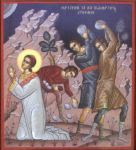







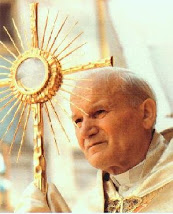

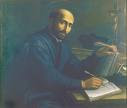




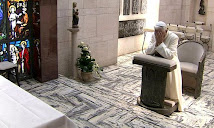


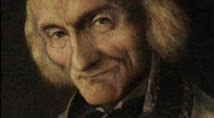

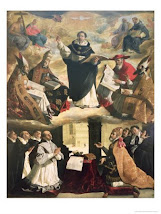
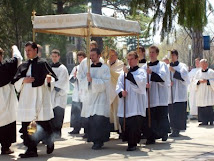

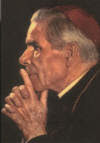

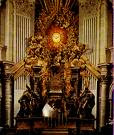
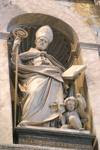



No comments:
Post a Comment